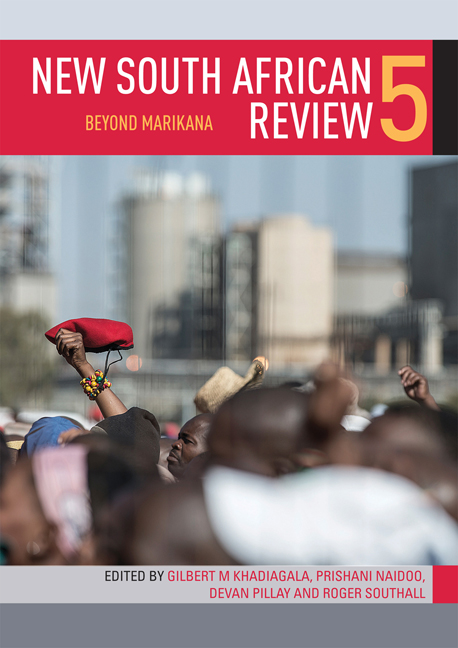Preface
Published online by Cambridge University Press: 21 April 2018
Summary
Beyond Marikana, the fifth edition of the New South African Review, continues to present informed, scholarly discussion and debate about key issues animating the South African experience. Produced between January 2014 and May 2015, this particular volume was shaped largely around the contention that there are significant political shifts underway in South Africa today, with several chapters tracing their fault lines to the 2012 massacre by police of striking mineworkers in a place called Marikana.
Although the third volume in the New South African Review series offered an analysis and critique of the various forces immediately implicated in the tragedy associated with Marikana, it could not have anticipated the kinds of political ructions that we have since witnessed, especially from within different parts of the African National Congress (ANC) Alliance. The fifth volume once again, then, consciously draws attention to Marikana, but this time asking what its effects and affects have been, and why it has had such an impact. In this way, Marikana becomes the starting point for a much broader discussion and debate about the potential for new political alliances and forms to emerge in the current context, a discussion that resonates globally in the wake of the political experiments of movements, such as Occupy Tahrir, Occupy Wall Street and the Spanish Indignados, and will hopefully continue in editions to come.
New South African Review 5 also offers close analyses of contemporary developments with regard to other aspects of, and issues affecting, South African society – including corruption, the economy, the Constitution, and uranium poisoning as a by-product of the mining industry.
This volume would not have been possible without the generosity of all its authors, to whom we are extremely grateful. Thanks must also go to the team at Wits University Press who continue to provide excellent guidance, assistance, skill and support to us as editors, and ensure that there is a final product for us to share. Particular thanks to the Dean of Humanities, Professor Ruksana Osman; Head of the School of Social Studies, Professor Shahid Vawda; and the Strategic Planning and Allocation of Resources Committee (Sparc) Fund for their ongoing support of the New South African Review.
- Type
- Chapter
- Information
- New South African Review 5Beyond Marikana, pp. ix - xPublisher: Wits University PressPrint publication year: 2015



